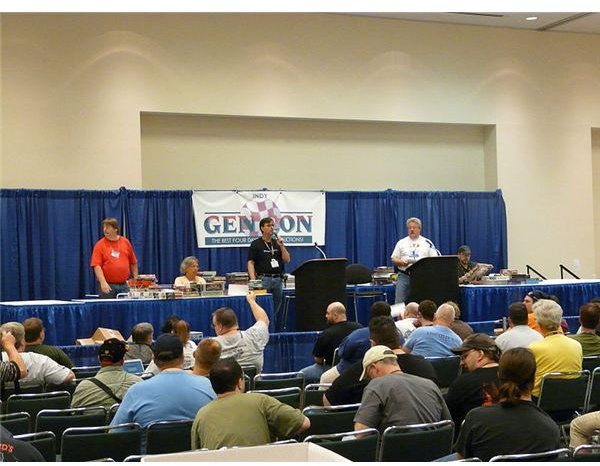What is Involved in a Bank Foreclosure Auction?: Know the Foreclosure Procedures Involved
Bank Foreclosure Methods

In knowing what is involved in a bank foreclosure auction, the reader should first come to an understanding that there are different ways by which banks foreclose the collateral of a defaulted loan. This will depend on what the state laws allow and the type of deed that covers the loan.
As opposed to a judicial proceeding where the foreclosed properties are sold at public auctions, a bank foreclosure auction, refers to the non-judicial processes, which may include the following:
Power of Sale Foreclosure – In this type of foreclosure, the borrower enters into a pre-foreclosure agreement with the bank or lender. As a non-judicial process, their agreement does not have to pass through a court of law; hence, considered as a fairly swift method of paying-off a defaulted loan.
The bank sells the property by way of auction, not by virtue of its rights of ownership, but through the power of a “Deed in Lieu of Foreclosure” and an “Agreement in Lieu of Mortgage” along with a “Deed of Sale” pre-signed by the borrower. The pre-signed “Deed of Sale” will be finalized in favor of the winning bidder who bids for the latter’s property, in any of the bank-held auction proceedings.
There are several important factors to consider under this agreement:
-
The borrower may be asked to execute a waiver, in which he relinquishes his right to claim the amount in excess of the selling price and the amount of the defaulted loan.
-
Under this system, the signed “Deed of Sale in Lieu of “includes a clause, in which the borrower likewise relinquishes his rights for redemption over the foreclosed property. However, some state laws still grant the borrower a specific grace-period to redeem the property, even after it has been sold at a bank auction.
-
A particular clause is incorporated in the deed, which gives the lender the right to sell the property, in order to extinguish the borrower’s obligation.
-
Not all US states allow the Power of Sale Foreclosure method.
Strict Foreclosure – This type of foreclosure is usually agreed upon as part of the terms and conditions during the granting of the mortgage loan. Its mechanics are simple, wherein the borrower executes the same deed required in the Power of Sale Foreclosure; but under this agreement the Deed of Sale will be executed in favor of the bank. The sale will be enforced once the borrower fails to settle the loan in default.
The bank’s right to foreclose and sell the property as the rightful owner is subject to the provisions that the borrower was properly notified about his defaulted loan payments and of the consequential non-judicial foreclosure proceedings.
This is considered as a modern method of recovering the bank’s credit exposure without having to incur additional costs related to judicial hearings and public auctions. In addition, the bank or lender has better chances of recovering the full amount of the defaulted loan, the corresponding interests and penalty charges, as well as other related pre-foreclosure costs.
Similar to Power of Sale Foreclosures, the agreement may also include the borrower’s abandonment of his rights over the property, which includes his rights for redemption. Likewise, not all U.S. states allow this type of foreclosure method.
For purposes of comparison, below is a description of a judicial foreclosure procedures, which involves public auctions in order to dispose of the property.

Foreclosure via Judicial Proceedings
This is the traditional method of foreclosure, covered by a Deed of Mortgage which requires court hearings and deliberations before the property becomes bank–owned. Thereafter, the selling of such properties are required to be placed under the supervision of the County Sheriff or a court-assigned public auctioneer at publicly-held auctions.
Based on the information provided above, it is, therefore, clear that auctions held by banks include properties foreclosed by way of non-judicial proceedings covered by Deeds in Lieu of Foreclosure and pre-signed Deeds of Sale.
In determining what is involved in a bank foreclosure auction, it would also be best if the prospective buyer examines the accompanying deeds executed by the parties to the foreclosure. Such documents will manifest the powers and the limits of said powers vested to the bank, when auctioning-off the property.
Please proceed to the next page for information about the US state laws that allow non-judicial proceedings and the basic procedures involved.
Overview of State Foreclosure Laws for Non-Judicial Bank Foreclosure Auctions
US state laws that allow non-judicial proceedings by virtue of the Deed in Lieu of Foreclosure vary from state to state.
-
Some state laws do not allow the bank or lender to act as receiver of the property. In such cases, banks are required to seek the court’s assistance and approval for a third-party or trustee to act as the receiver and administrator.
-
Other state laws do not allow the waiver of redemption rights as a condition to the Deed in Lieu of Foreclosure. This is important since any waiver or clause incorporated in the deed, which waives the right of the borrower-owner to redeem the property, will be nullified if the state does not allow it. As a result, this will diminish the viability of buying the property, since the borrower can still reclaim his ownership.
-
In basically the same context, there are state laws that allow the lender to claim deficiencies for the full settlement of the loan. This puts the borrower in a disadvantage in case he short-sells his property, since he will still be burdened by the deficiency. His only recourse is to look for a buyer who is willing to buy the property at the price equivalent to the entire amount of his obligation, within the specified period of time.
-
The most important requirement for all non-judicial agreements is that, a copy of the deed should be submitted to and be recorded at the respective public registry office. That way, the information will be accessible to anyone conducting title verification.
Basic Procedures Involved in Non-Judicial Bank Foreclosure Auctions

- The notice for the non-judicial sale of the property must be posted for a time period required by law, usually, for a month. This must be published in a widely read newspaper and posted at the local courthouse door and in at least three other public places.
A copy of the notice should be sent to the borrower, indicating the date, the starting bid price, the time and place where the property will be auctioned. The borrower can still stop the auction sale by paying off his obligation any time before the actual auction date.
-
The bank usually hires an auction company to handle the bidding and selling activities.
-
Bidders are required to register with the company before the actual date of auction takes place. In addition, a minimum deposit amount specified by the state foreclosure laws will be paid by the bidder before he is allowed to participate in the bidding.
-
Said deposits are refundable in nature, except for those deposited by the winning bidders. In such cases, the deposit will be retained by the auction house, to be applied as partial payment for the property for which the bid was won.
-
The winning bidder will have to settle the entire amount on the following day up to the hour specified, usually within office hours.
-
In some US states, the auction company is allowed to demand full payment on the same day the bid was won.
-
The transfer of ownership for the property and application of sales proceeds as loan payment will be completed within seven days or within the number of days prescribed by state laws.
-
The bank may bid for the property; in some cases, bidding is done by the trustee in behalf of the lender.
-
If the law so requires, the winning bid should meet the minimum amount prescribed by the state. If this cannot be met, re-auctioning of the property may take place after a period required by state foreclosure laws. Upon re-auctioning, however, the amount of the winning bid will no longer be restricted to a minimum amount.
-
Postponement of an auction sale is possible and may be rescheduled for a specific number of times prescribed by state foreclosure laws. In the event that re-scheduling exceeds the number of times so prescribed, a new notice will be published in order to re-auction the property.
-
All properties sold at auctions are put up for sale on “as is, where is” basis; hence, the prospective bidders should take it upon themselves to inspect the property before participating in the bidding process.
Summary
Generally, what is involved in a bank foreclosure auction will all depend on what the state foreclosure laws require. Hence, the first most important step to take when buying a property via bank auctions, is to know what the state laws prescribe.
To find information about state specific foreclosure laws and timelines observed, readers may refer to Foreclosure State Laws by RealtyTrac.
Reference Materials and Image Credit Section
References:
- https://resources.lawinfo.com/en/Legal-FAQs/Consumer-Finance-and-Foreclosure/Federal/what-is-strict-foreclosure.html
- https://www.realtytrac.com/foreclosure/overview.html
Image Credits:
- All images posted are courtesy of Wikimedia Commons